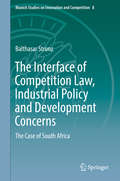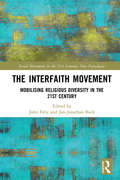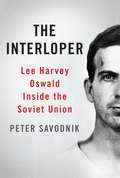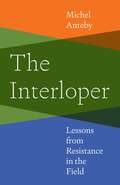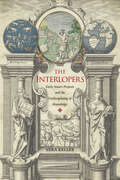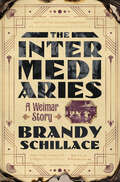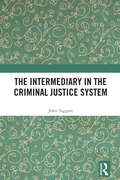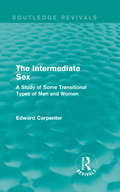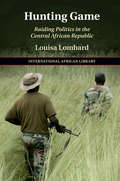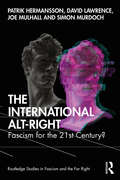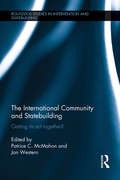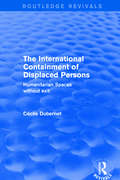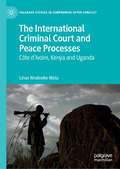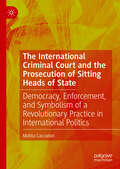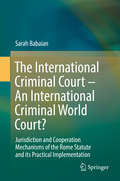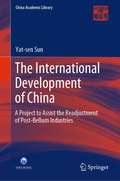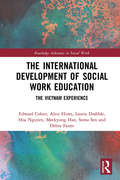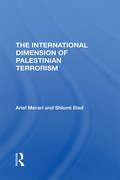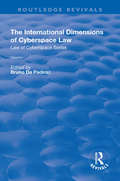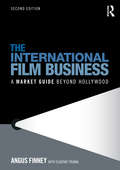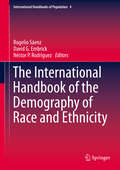- Table View
- List View
The Interface of Competition Law, Industrial Policy and Development Concerns: The Case of South Africa (Munich Studies on Innovation and Competition #8)
by Balthasar StrunzThis book analyses essential concepts of competition law and industrial policy, and shows where the two areas clash with and complement each other, respectively. The discussion takes place in the context of developing countries, taking into consideration their realities and specific needs. South Africa serves as a real-world example for competition law that goes beyond the notion of consumer welfare. An in-depth analysis of the enforcement of South African law illustrates how the law is used both to combat the negative effects of past industrial policy, and to accommodate current economic and social needs.The book is intended for all readers with an interest in the enforcement of competition law in developing countries. It will particularly benefit those who want to learn about unorthodox approaches that integrate the concept of “public interest” and social imperatives into the application of competition law.
The Interfaith Movement: Mobilising Religious Diversity in the 21st Century (Social Movements in the 21st Century: New Paradigms)
by John Fahy Jan-Jonathan BockAlthough its beginnings can be traced back to the late 19th century, the interfaith movement has only recently begun to attract mainstream attention, with governments, religious leaders and grassroots activists around the world increasingly turning to interfaith dialogue and collective action to address the challenges posed and explore the opportunities presented by religious diversity in a globalising world. This volume explores the history and development of the interfaith movement by engaging with new theoretical perspectives and a diverse range of case studies from around the world. The first book to bring together experts in the fields of religion, politics and social movement theory to offer an in-depth social analysis of the interfaith movement, it not only sheds new light on the movement itself, but challenges the longstanding academic division of labour that confines ‘religious’ and ‘social’ movements to separate spheres of inquiry.
The Interloper: Lee Harvey Oswald Inside the Soviet Union
by Peter SavodnikLee Harvey Oswald’s assassination of President Kennedy in 1963 remains one of the most horrifying and hotly debated crimes in American history. Just as perplexing as the assassination is the assassin himself; the 24-year-old Oswald’s hazy background and motivations#151;and his subsequent murder at the hands of Jack Ruby#151;make him an intriguing yet frustratingly enigmatic figure. Because Oswald briefly defected to the Soviet Union, some historians allege he was a Soviet agent. But as Peter Savodnik shows in The Interloper, Oswald’s time in the U. S. S. R. reveals a stranger, more chilling story. Oswald ventured to Russia at the age of 19, after a failed stint in the U. S. Marine Corps and a childhood spent shuffling from address to address with his unstable, needy mother. Like many of his generation, Oswald struggled for a sense of belonging in postwar American society, which could be materialistic, atomized, and alienating. The Soviet Union, with its promise of collectivism and camaraderie, seemed to offer an alternative. While traveling in Europe, Oswald slipped across the Soviet border, soon settling in Minsk where he worked at a radio and television factory. But Oswald quickly became just as disillusioned with his adopted country as he had been with the United States. He spoke very little Russian, had difficulty adapting to the culture of his new home, and found few trustworthy friends; indeed most, it became clear, were informing on him to the KGB. After nearly three years, Oswald returned to America feeling utterly defeated and more alone than ever#151;and as Savodnik shows, he began to look for an outlet for his frustration and rage. Drawing on groundbreaking research, including interviews with Oswald’s friends and acquaintances in Russia and the United States, The Interloper brilliantly evokes the shattered psyche not just of Oswald himself, but also of the era he so tragically defined.
The Interloper: Lessons from Resistance in the Field
by Michel AntebyA practical and theoretical guide for field researchers struggling with accessResistance is the bane of all field researchers, who are often viewed as interlopers when they enter a community and start asking questions. People obstruct investigations and hide evidence. They shelve complaints, silence dissent, and even forget their own past and deny having done so. How can we learn about a community when its members resist so strongly? The answer is that the resistance itself is sometimes the key.Michel Anteby explains how community members often disclose more than intended when they close ranks and create obstacles. He draws insights from diverse stories of resistance by uncooperative participants—from Nazi rocket scientists and Harvard professors to Disney union busters and people who secure cadavers for medical school dissection—to reveal how field resistance manifests itself and how researchers can learn from it. He argues that many forms of resistance are retrospectively telling, and that these forms are the routine products, not by-products, of the field. That means that resistance mechanisms are not only indicative of something else happening; instead, they often are the very data points that can shed light on how participants make sense of their worlds.An essential guide for ethnographers, sociologists, and all field researchers seeking access, The Interloper shares practical and theoretical insights into the value of having the door slammed in your face.
The Interlopers: Early Stuart Projects and the Undisciplining of Knowledge
by Vera KellerA reframing of how scientific knowledge was produced in the early modern world.Many accounts of the scientific revolution portray it as a time when scientists disciplined knowledge by first disciplining their own behavior. According to these views, scientists such as Francis Bacon produced certain knowledge by pacifying their emotions and concentrating on method. In The Interlopers, Vera Keller rejects this emphasis on discipline and instead argues that what distinguished early modernity was a navigation away from restraint and toward the violent blending of knowledge from across society and around the globe.Keller follows early seventeenth-century English "projectors" as they traversed the world, pursuing outrageous entrepreneurial schemes along the way. These interlopers were developing a different culture of knowledge, one that aimed to take advantage of the disorder created by the rise of science and technological advances. They sought to deploy the first submarine in the Indian Ocean, raise silkworms in Virginia, and establish the English slave trade. These projectors developed a culture of extreme risk-taking, uniting global capitalism with martial values of violent conquest. They saw the world as a riskscape of empty spaces, disposable people, and unlimited resources.By analyzing the disasters—as well as a few successes—of the interlopers she studies, Keller offers a new interpretation of the nature of early modern knowledge itself. While many influential accounts of the period characterize European modernity as a disciplining or civilizing process, The Interlopers argues that early modernity instead entailed a great undisciplining that entangled capitalism, colonialism, and science.
The Intermediaries: A Weimar Story
by Brandy SchillaceThe fascinating history of a daring team of sexologists who built the first trans clinic in the shadow of the Third Reich. Set in interwar Germany, The Intermediaries tells the forgotten story of the Institute for Sexual Science, the world’s first center for homosexual and transgender rights. Headed by a gay Jewish man, Dr. Magnus Hirschfeld, the institute aided in the first gender-affirming surgeries and hormone treatments, acting as a rebellious base of operations in the face of rising prejudice, nationalism, and Nazi propaganda. An expert in medical history, Brandy Schillace tells the story of the Institute through the eyes of Dora Richter, an Institute patient whom we follow in her quest to transition and live as a woman. While the colorful but ultimately tragic arc of Weimar Berlin is well documented, The Intermediaries is the first book to assert the inseparable, interdependent relationship of sex science to both the queer rights movement and the permissive Weimar culture, tracking how political factions perverted that same science to suit their own ends. This riveting book brings together forgotten scientific and surgical discoveries (including previously untranslated archival material from Berlin) with the politics and social history that galvanized the first stirrings of the trans rights movement. Through its unforgettable characters and immersive, urgent storytelling, The Intermediaries charts the relationships between nascent sexual science, queer civil rights, and the fight against fascism. It tells riveting stories of LGBTQ pioneers—a surprising, long-suppressed history—and offers a cautionary tale in the face of today’s oppressive anti-trans legislation.
The Intermediary in the Criminal Justice System
by John TaggartThis book undertakes a sociolegal examination of the intermediary role within the criminal justice system.The intermediary special measure is one of the most innovative and controversial developments in the history of English criminal procedure. But what does the role actually involve? That is the central question explored in this book. Despite increased academic attention into this new criminal justice actor, the content of the intermediary role remains unclear. Based centrally on empirical data gathered in England and Wales and Northern Ireland, but also drawing upon comparative material from other jurisdictions, the book examines how those executing the intermediary role understand its work and how other criminal justice actors perceive it. The book then uses this as the basis for generating a theory of the intermediary role and its scope and content. It also considers the future of the role and its integration into the criminal justice system.This book will appeal to those researching and studying in the areas of sociolegal studies, criminal law and criminology, as well as lawyers, judges, intermediaries and policy makers working in relevant areas.
The Intermediate Sex: A Study of Some Transitional Types of Men and Women (Routledge Revivals: The Collected Works of Edward Carpenter)
by Edward CarpenterThe Intermediate sex collates papers from Edward Carpenter on his ideas about intermediate types. Carpenter claims that there are those in societies who hold an intermediate position between the two sexes and may have an inner sex in their mind that is different from their biological sex. Originally published in 1908, this version in1941, these papers present early observations about gender fluidity in both men and women, studying certain ‘types’ of intermediate people that he claimed were begin to emerge more obviously at the time of writing. This title will be of interest to students of gender studies.
The International African Library: After Rape
by Holly PorterFollowing the ICC intervention in 2005, northern Uganda has been at the heart of international justice debates. The emergent controversy, however, missed crucial aspects of Acholi realities: that the primary moral imperative in the wake of wrongdoing was not punishment but, instead, the restoration of social harmony. Drawing upon abundant fieldwork and in-depth interviews with almost 200 women, Holly Porter examines issues surrounding wrongdoing and justice, and sexual violence and rape, among the Acholi people in northern Uganda. This intricate exploration offers evidence of a more complicated and nuanced explanation of rape and its aftermath, suggesting a re-imagining of the meanings of post-atrocity justice, whilst acknowledging the role of sex, power and politics in all sexual experiences between coercion and consent. With its wide investigation of social life in northern Uganda, this provocative study offers vital analysis for those interested in sexual and gender violence, post-conflict reconstruction and human rights.
The International African Library: Pioneers of the Field
by Andrew BankFocusing on the crucial contributions of women researchers, Andrew Bank demonstrates that the modern school of social anthropology in South Africa was uniquely female-dominated. The book traces the personal and intellectual histories of six remarkable women through the use of a rich cocktail of new archival sources, including family photographs, private and professional correspondence, field-notes and field diaries, published and other public writings and even love letters. The book also sheds new light on the close connections between their personal lives, their academic work and their anti-segregationist and anti-apartheid politics. It will be welcomed by anthropologists, historians and students in African studies interested in the development of social anthropology in twentieth-century Africa, as well as by students and researchers in the field of gender studies.
The International African Library: Raiding Politics In The Central African Republic (The\international African Library #61)
by Louisa LombardThe International African Library: Zimbabwe's Migrants and South Africa's Border Farms
by Maxim BoltDuring the Zimbabwean crisis, millions crossed through the apartheid-era border fence, searching for ways to make ends meet. Maxim Bolt explores the lives of Zimbabwean migrant labourers, of settled black farm workers and their dependants, and of white farmers and managers, as they intersect on the border between Zimbabwe and South Africa. Focusing on one farm, this book investigates the role of a hub of wage labour in a place of crisis. A close ethnographic study, it addresses the complex, shifting labour and life conditions in northern South Africa's agricultural borderlands. Underlying these challenges are the Zimbabwean political and economic crisis of the 2000s and the intensified pressures on commercial agriculture in South Africa following market liberalization and post-apartheid land reform. But, amidst uncertainty, farmers and farm workers strive for stability. The farms on South Africa's margins are centers of gravity, islands of residential labour in a sea of informal arrangements.
The International Alt-Right: Fascism for the 21st Century? (Routledge Studies in Fascism and the Far Right)
by David Lawrence Patrik Hermansson Joe Mulhall Simon MurdochThe alt-right has been the most important new far-right grouping to appear in decades. Written by researchers from the anti-racist advocacy group HOPE not hate, this book provides a thorough, ground-breaking, and accessible overview of this dangerous new phenomenon. It explains where the alt-right came from, its history so far, what it believes, how it organises and operates, and its future trajectory. The alt-right is a genuinely transnational movement and this book is unique in offering a truly international perspective, outlining the influence of European ideas and movements as well as the alt-right's development in, and attitude towards, countries as diverse as Japan, India, and Russia. It examines the ideological tributaries that coagulated to form the alt-right, such as white supremacy, the neo-reactionary blogosphere, the European New Right, the anti-feminist manosphere, the libertarian movement, and digital hate culture exemplified by offensive memes and trolling. The authors explore the alt-right's views on gender, sexuality and masculinity, antisemitism and the Holocaust, race and IQ, globalisation and culture as well as its use of violence. The alt-right is a thoroughly modern far-right movement that uses cutting edge technology and this book reveals how they use cryptocurrencies, encryption, hacking, "meme warfare", social media, and the dark web. This will be essential reading for scholars and activists alike with an interest in race relations, fascism, extremism, and social movements.
The International Community and Statebuilding: Getting Its Act Together? (Routledge Studies in Intervention and Statebuilding)
by Patrice C. McMahon and Jon WesternThis book brings together policymakers and academics to analyse the international community’s performance in post-war statebuilding projects. In the past twenty years, statebuilding has emerged as a centerpiece of international efforts to stabilize violent conflicts. From the Balkans, to Iraq, to Afghanistan, it has become widely accepted that statebuilding—defined as the development of transparent and accountable political institutions, stable and sustainable economic structures, professional public administrations, and civilian-controlled security services—is essential to the long-term stability of post-conflict settlements. The International Community and Statebuilding brings together senior-level policymakers and academics in order to analyse the international community’s performance in post-war statebuilding projects. Filling an important gap in the existing body of work on this topic, the contributors explore how international state builders have attempted to negotiate the intersections of multilateralism, competing strategic priorities and agendas, organizational complexity, and domestic politics. This book will be of much interest to students of statebuilding, peacebuilding, war and conflict studies, and International Relations in general.
The International Containment of Displaced Persons: Humanitarian Spaces without Exit (Routledge Revivals)
by Cecile DubernetThis title was first published in 2001. This work examines four post-Cold War interventions launched on behalf of people on the move: international action in Iraq, Bosnia, Somalia and Rwanda. Because these crises accompanied the emergence of the concept of Internationally Displaced Persons (IDPs) in international relations, they have shaped the understandings of forced displacement issues, such as ethnic cleansing, need and humanitarian action. The author looks at attitudes towards IDPs, concluding that UN-backed interventions regarding displaced civilians were primarily about deterring, sometimes preventing, them from escaping places of conflict. Protection in this context became a device by which international protagonists sought to contain people on the move within the confines of their collapsed states. As a result, levels of safety effectively granted by the international community depended less on the vulnerability of populations than on Western fears of mass border crossings.
The International Crime Drop
by Jan Van DijkDrawing on new studies from major European countries and Australia, this exciting collection extends the ongoing debate on falling crime rates from the perspective of criminal opportunity or routine activity theory. It analyses the effect of post WW2 crime booms which triggered a universal improvement in security across the Western world.
The International Criminal Court and Peace Processes: Cȏte d’Ivoire, Kenya and Uganda (Palgrave Studies in Compromise after Conflict)
by Linus Nnabuike MaluThis book explores the extent to which the International Criminal Court (ICC) has influenced peace processes in Cȏte d’Ivoire, Kenya and Uganda. It examines how the prosecution of those who bear the greatest responsibility for crimes committed in these countries may have negatively or positively influenced the process of making peace in their wake. It is concerned with how international accountability affects post-conflict countries and what the ICC brings to peace processes. The central question addressed by the book is whether justice spurs peace in post- conflict societies or whether justice complicates the peace process. If so, how? Relying on qualitative studies in these countries, this book comparatively analyses the impact of the interventions of the ICC in Uganda (2004), Kenya (after the 2007/2008 post-election violence), and Cȏte d’Ivoire. Its aim is to provide an evidence-based account of how the involvement of the ICC in these countries influences the processes of promoting peace. To gauge this, Malu develops an analytical framework which is based on four variables: deterrence, victims’ rights, reconciliation and accountability to the law. This book will appeal to those interested in post-conflict reconstruction, transitional justice, peace studies, conflict transformation, and international criminal law, including peace practitioners and those working in the field of international justice.
The International Criminal Court and the Prosecution of Sitting Heads of State: Democracy, Enforcement, and Symbolism of a Revolutionary Practice in International Politics
by Mattia CacciatoriThe practice of prosecuting sitting Heads of State (SHoS) by the International Criminal Court (ICC) represents a revolutionary and morally compelling pursuit of justice for those who commit the most heinous crimes known to humanity, regardless of their status. This book embarks on an exploration of the intricate political dynamics surrounding this complex practice, delving into six pivotal cases where the ICC grappled with the idea of prosecuting SHoS. These cases include Uganda, Sudan, Kenya, Libya, Syria, and Russia, encompassing all instances where the ICC directly targeted SHoS, as well as two cases where the Court was unable or unwilling to act. The investigation focuses on the multifaceted political complexities involved in initiating investigations against SHoS. It also delves into the far-reaching domestic and international consequences these prosecutions carried, profoundly impacting both the host societies and the international arena.
The International Criminal Court – An International Criminal World Court?: Jurisdiction And Cooperation Mechanisms Of The Rome Statute And Its Practical Implementation
by Sarah BabaianThis book provides an analysis of whether the International Criminal Court can be regarded as an International Criminal World Court, capable of exercising its jurisdiction upon every individual despite the fact that not every State is a Party to the Rome Statute. The analysis is based on a twin-pillar system, which consists of a judicial and an enforcement pillar. The judicial pillar is based on the most disputed articles of the Rome Statute; its goal is to determine the potential scope of the Court’s strength through the application of its jurisdiction regime. The enforcement pillar provides an analysis of the cooperation and judicial assistance mechanism pursuant to the Rome Statute’s provisions and its practical implementation through States’ practices. The results of the analysis, and the lack of an effective enforcement mechanism, demonstrate that the ICC cannot in fact be considered a criminal world court. In conclusion, possible solutions are presented in order to improve the enforcement pillar of the Court so that the tremendous strength of the ICC’s judicial pillar, and with it, the exercise of worldwide jurisdiction, can be effectively implemented.
The International Development of China: A Project to Assist the Readjustment of Post-Bellum Industries (China Academic Library)
by Yat-sen SunThis book presents a rough sketch of Dr. Yat-sen Sun’s (1866-1925) requirements for modernizing China and elaborates on Sun’s desire for the then China to implement a sweeping wave of economic reconstruction and development reforms concerning its railroads and highways, river conservancy and irrigation, new ports and modern cities, by absorbing international capital coming to China. In the preface to this book, first published in 1922, Yat-sen Sun posits, “Unless the Chinese question can be settled peacefully, another world war greater and more terrible than the one just past will be inevitable.” In order to solve the “Chinese question,” he suggested that the country’s vast resources be developed internationally under a socialistic scheme, both for the good of the world in general and the Chinese people in particular. It was his hope that such a scheme would abolish the prevalent spheres of influence of the time, and that the class struggle between capital and labor could be avoided. In this book, Yat-sen Sun presents his solutions for three great questions of global importance: International War, Commercial War and Class War.
The International Development of Social Work Education: The Vietnam Experience (Routledge Advances in Social Work)
by Edward Cohen Hoa Nguyen Alice Hines Laurie Drabble Meekyung Han Soma Sen Debra FairesA robust infrastructure for education and training is vital for the development of an emerging social work education in developing countries. This book fills a gap in the existing literature by providing analysis of international practice methods which can be used by developing countries to develop their own professional and educational infrastructures. The authors’ experience of over eight years in Vietnam in enhancing social work education has yielded important information about the contexts, approaches, and lessons learned when disseminating educational systems and content in non-Western countries. Covering improvements to faculty expertise, university leadership, curriculum, and the use of technology with careful attention to cultural contexts, the chapters describe a model of knowledge transfer which can be generalized to other countries and other fields with emerging professions. International Development of Social Work Education should be considered required reading for all social work academics, students and professionals as well as those working in social and community development.
The International Dimension Of Palestinian Terrorism
by Ariel Merari Shlomi EladTerrorism, by its very nature, is a dynamic and rapidly changing phenomenon. This is particularly true of Palestinian terrorism: it is pluralistic in composition, flourishes in a highly volatile region, and is affected by numerous external actors and elements. Hence any attempt to produce research on Palestinian terrorism of a completely up-to-date nature is doomed to failure. Most of the work on this study was completed by the fall of 1985, and the statistics presented generally cover the period 1968-1984.
The International Dimensions of Cyberspace Law (Routledge Revivals)
by Cyberspace SeriesThis title was first published in 2003. This text is part of the "Law of Cyberspace" series, which deals with the legal aspects of the emerging information society and corresponding ethical matters. The book examines the international dimensions of cyberspace law and the timeliness of drawing up the most appropriate international standard instrument for this environment, exploring ways and means of achieving it and defining the organization's precise role in this respect. The text presents the framework that UNESCO is helping to develop for the international community, with the participation of all the actors in cyberspace, aiming to be ethical, flexible and technologically neutral, multiform, and universal.
The International Film Business: A Market Guide Beyond Hollywood
by Angus FinneyThe International Film Business examines the independent film sector as a business, and addresses the specific skills and knowledge it demands. It describes both the present state of the industry, the significant digital and social media developments that are continuing to take place, and what changes these might effect. The International Film Business: describes and analyses the present structure of the film industry as a business, with a specific focus on the film value chain discusses and analyses current digital technology and how it potentially may change the structure and opportunities offered by the industry in the future provides information and advice on the different business and management skills and strategies includes case studies on a variety of films including The Guard (2011), The King’s Speech (2010), The Best Exotic Marigold Hotel (2012), Cloverfield (2008), Pobby & Dingan (aka Opal Dream, 2005), Confessions of a Dangerous Mind (2002), The Reckoning (2002)and The Mother (2003), and company case studies on Pixar, Renaissance, Redbus and Zentropa. Further case studies on films that failed to go into production include Neil LaBute’s Vapor and Terry Gilliam’s Good Omens. Taking an entrepreneurial perspective on what future opportunities will be available to prepared and informed students and emerging practitioners, this text includes case studies that take students through the successes and failures of a variety of real film companies and projects and features exclusive interviews with leading practitioners in all sectors of the industry, from production to exhibition.
The International Handbook of the Demography of Race and Ethnicity
by Rogelio Sáenz David G. Embrick Néstor P. RodríguezExamining key countries in every region of world, this handbook presents population profiles and analyses concerning racial/ethnic disparities and changing intergroup relations. Inside, prominent scholars from various parts of the world and disciplines address the links between stratification, demography, and conflict across the globe. Organized by region/continent, coverage for each profiled country includes demographic information; a historical overview that addresses past racial/ethnic conflict; identification of the most salient demographic trends and issues that the country faces; theoretical issues related to the linkages between stratification, demography, and conflict; methodological issues including quality of data and cutting-edge methods to better understand the issue at hand; and details on the possible future of the existing trends and issues with particular emphasis on public policy and human rights. This handbook will help readers to better understand the commonalities and differences that exist globally in the interplay between stratification, demography, and conflict. In addition, it also provides an excellent inventory of theoretical perspectives and methodological approaches that are needed to better comprehend this issue. This handbook will appeal to students, researchers, and policy analysts in the areas of race and ethnic relations, demography, inequality, international sociology, international relations, foreign studies, social geography, and social development.
